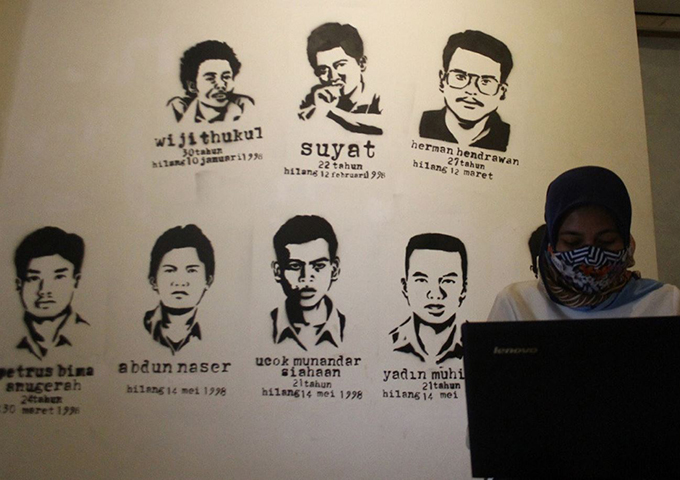
By Indria Fernida in Jakarta
Yesterday, 16 years ago, Munir Said Thailb, a defender of human rights, was murdered with arsenic poison aboard a Garuda plane on his way to the Netherlands to pursue his postgraduate studies.
An official independent joint investigation team later concluded it was a premeditated murder.
However, the mastermind of the assassination has not been prosecuted.
If Munir was still alive, he would have said “justice delayed, justice denied”, very similar to the serious human rights crimes that he had fought against in Indonesia.
The findings and recommendations of the 2005 independent fact-finding team into the killing, established by then-president Susilo Bambang Yudhoyono, were disregarded by his government and the government that followed and have never been made public.
The current government refuses to recognise the existence of the official report, even though the Central Information Commission has ruled that the document should be publicly disclosed.
The report could lead to a criminal investigation if there is the political will from the government to reveal the truth.
‘Black September’ rights violations
It seems like something of a coincidence that many serious human rights violations in Indonesia have taken place in September, which is why we refer to it as “Black September”. Apart from the killing of Munir on September 7, 2004, the “scorched earth” mass violence in East Timor, now Timor-Leste, occurred in September 1999 after people in the territory voted for independence from Indonesia.
In the same year, violence perpetrated by troops resulted in the deaths of student protesters in Jakarta in the Semanggi 2 tragedy on September 24.
The carnage in Tanjung Priok happened on September 12, 1984, and the mass killings and persecution of people deemed to be followers and sympathisers of the Indonesian Communist Party began after the September 30, 1965, movement.
During his life, Munir worked tirelessly to demand justice for victims of human rights violations, including the victims of those aforementioned atrocities.
He would never have thought he would also be on the “Black September” victims list, although he several times acknowledged that he risked losing his life as a consequence of his fearless fight.
Unfortunately, the murder of Munir was not the last serious human rights violation committed against human rights and democracy defenders in the country. Violence has continued to be used against human and women’s rights activists, labor and farmer activists, corruption watchdogs and leaders of indigenous groups who defend their communities, land and cultural pride, as well as journalists and bloggers who promote human rights.
According to human rights monitors, many Indonesian human rights defenders have been increasingly exposed to threats, harassment, intimidation, violence, prosecution and defamation.
Examples of attacks on advocates
Among the prominent examples are the acid attack against Corruption Eradication Commission (KPK) investigator Novel Baswedan, the prosecution of lecturer Saiful Mahdi from the University of Syiah Kuala for criticising his university policies, the arbitrary arrest of musician Ananda Badudu for using crowdfunding to support student movements, the arrest of journalist Dhandy Dwi Laksono and the hate speech charges leveled against human rights lawyer Veronika Koman for revealing alleged human rights abuses in Papua.
Some people who have defended the rights of local communities to land and the environment have also paid for their advocacy work with their lives. I can recall Yanes Balubun in Maluku, Salim Kancil in East Java and more recently Golfrid Siregar in North Sumatra.
Justice has not been served in any of these human rights violations. The truth surrounding those cases has never been revealed either, due to the absence of credible and independent investigations, which are required under the United Nations Declaration on Human Rights Defenders. It is very hard to establish a complete truth that can provide the lessons needed to guarantee such acts are not repeated.
The UN Declaration on Human Rights Defenders, adopted by the UN General Assembly in December 1998, recognizes specific protections for human rights defenders, including the right to conduct human rights work individually and in association with others and to make complaints about official policies and acts relating to human rights and to have such complaints reviewed.
On the other hand, the state has the obligation to protect human rights defenders, and to conduct prompt and impartial investigations of alleged rights violations against them.
The murder of Munir illustrates the continuation of impunity in Indonesia. After 16 years, only recently did the UN Human Rights Committee, a body overseeing the implementation of the International Covenant on Civil and Political Rights (ICCPR) to which Indonesia is a state party, release a question on Munir’s case. The Indonesian government will have to answer, most likely in the second review session next year.
A similar recommendation on the specific case was raised in an initial review under the ICCPR in 2013. This is only one of many recommendations made by international human rights groups, which have persistently urged Indonesia to solve the killing of Munir and other cases of serious human rights violations in the country.
Impunity lingers on
Last year, Indonesia was reelected as a member of the UN Human Rights Council. This should have pushed the country to work harder to solve Munir’s case once and for all. On the contrary, impunity has facilitated the recurrence of human rights violations, weakened people’s trust in the law and left them defenseless when confronted with injustice.
Revealing the truth of the premeditated murder of Munir and prosecuting the main perpetrators will be an important step to ending the chain of impunity. A few years ago, President Joko “Jokowi” Widodo expressed a commitment to solve Munir’s case and other past serious human rights violations.
“Our homework is dealing with the past, including the case of Munir,” Jokowi said. Munir’s family and friends remain sceptical about the fulfillment of the promise.
However, all is not lost. Through hard work and creative campaigning by human rights groups, the first ever human rights museum built by a (local) government in Indonesia will be named after Munir.
During the anniversary of Munir’s birthday on December 8, 2019, the East Java governor kicked off the construction of the Munir Human Rights Museum in Batu city, Munir’s hometown. The museum will be managed by an independent group to ensure that Munir’s legacy will continue to inspire new generations.
We still have a long way to go on the road to justice, but I believe we are walking on the right path and soon many more will join us.
Indria Fernida is a board member of Museum Omah Munir and regional coordinator of Asia Justice and Rights (AJAR).







































